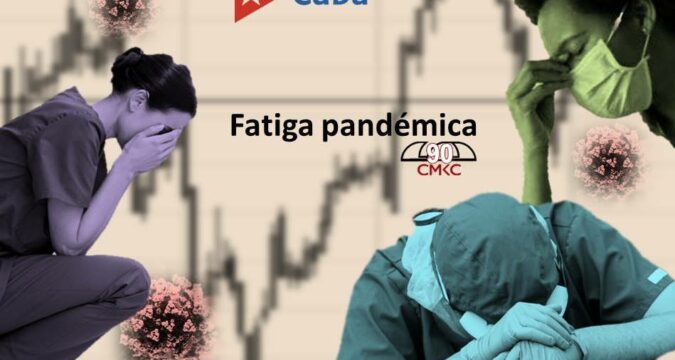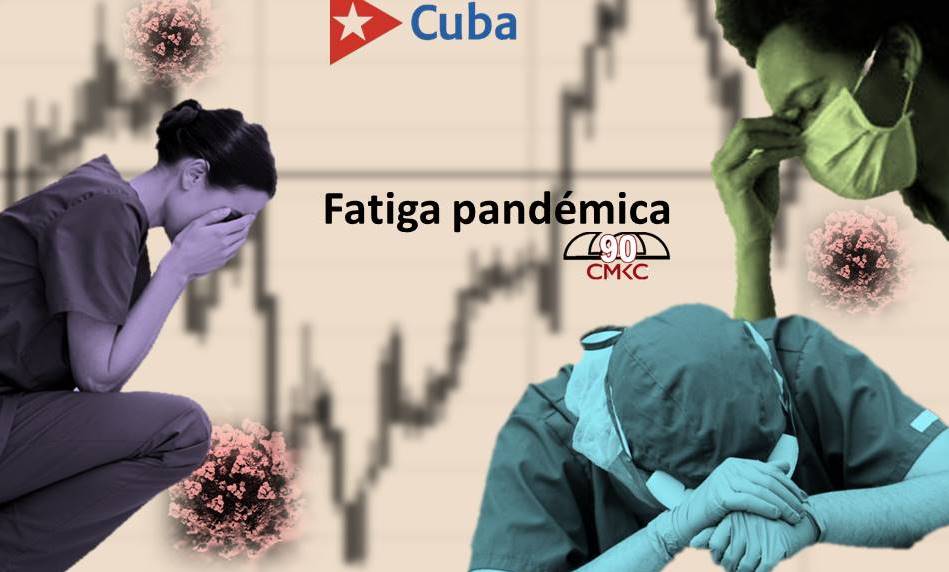

Pandemic fatigue- The news told by Doctor Durán are not good. What else can we do? We, psychologists, are not strange to the anxieties shared by the rest of our countrypeople, but we have the responsibility of helping manage them.
The news told by Doctor Durán are not good. What else can we do? We, psychologists, are not strange to the anxieties shared by the rest of our countrypeople, but we have the responsibility of helping manage them. The fact is that we are in front of a difficult, huge and dangerous paradox.

The virus that causes COVID-19 is more contagious and lethal and, at the same time, the energy used and the efforts made by the people, the families and the psychological energy needed to resist are dwindling, which is evident in the relaxation of the discipline to observe the health measures in both the family and society.
Cuba initiates WHO prequalification of its vaccines
The exhaustion caused by the prolongued time of hardship has been called pandemic fatigue by the WHO. Scientists explain that all pandemic cause an initial reaction of horror, but if it remains over time, it transforms into boredom and monotony. It is important to say that this is not a disease, but a state of mind caused by the long exposure to a set of stressful factors, directly related to the possible spread of the disease, wih the lockdown measures and wih the collateral effects of an economic crisis that makes life more difficult and complex. A person jokingly told me once that they have been functioning on “COVID mode” for so long, that their battery was running out. The term is a controversial one, because it places the nature of the problem in the individual, when the rise in the number of cases is actually the result of multiple factors. I think we should not try to make this a psychological phenomenom; instead, we need to provide tools of self-awareness that help boost responsibility and willpower.
The human being has a great capacity to adapt and lose the sense of awe in the face of any event. When a traumatic event loses its new and extraordinary qualities, it becomes costumary and provokes a decrease of the ability to raise the alarm. For many people, the warnings, the health advice, and even the announcement of new restrictive measures are more of the same and have been repeated so many times it is no longer effective or, in the best scenario, are naturally added to their routine and turn into daily habits. Monotony takes over and override our affections and our capacity to think.The symptoms of fatigue can provoke potentially dangerous behaviors, mental patterns, emotions and ways of behaving. We must be aware when we feel like losing control to avoid a bigger catastrophe.
The waning of risk perception contradictorily appears as a mechanism of psychological protection, a desperate search for a feeling of normality and continuity of life. However, it is a very dangerous to get used to fear in the current circunstamces. In the times of COVID-19, it is necessary to stay aware and fully conscious of the fear to the spread of the disease, to use them as adaptative resources in our favor, without letting our guard down.
Regardless of how reluctant we are to accept the circumstances, reality is there in all its harshness and nostalgia, and like passive expectancy, they are both futile. It is important to keep an attitude of acceptance, which does not mean resignation or passivity, but to develop an active approach to discern what is in our hands and we can transform and what is beyond our control and we must accept, which allow us to make new plans based on our possibilities.
As these restrictions have remained in place over time, the desire for autonomy grows, particularly among teenagers and young people, who becomes difficult to handle. Tolerance to frustration becomes too much and some youg people turn it into an angry protest because they have been deprived of their basic needs for contact and socialization for a very long time. This rebelliousness can be highly dangerous; some teenagers will challenge their parents’ authority, who in turn must use their persuasion and commitment keep teenagers from making decisions that put them at risk. Actually, love and care need reasons that are not longer enough to explain what they need to understand, but that must be overcome with protection and sense.
Amidst this pandemic, mood swings and negative emotions are a natural thing and the rollescoaster of emotions cannot be dodged. However; we must learn how to handle and accept them to prevent that irritability, nervousness and discouragement that ends up polluting our surroundings and turn it in a highly toxic environment that affects ourselves and everyone around us. We must watch if any incident triggers a disproportionate burst or if they are very sad every day for most of the time. At this point, unless the person is going through a mourning process, they should consider changing habits or seeking specialized help.
We see arrogant attitudes from some people who process the information by paying no attention to the suggestion made by the authorities, who tendentiously look for reasons to make them feel they are right and by picking the information that confirm their conclusions: “It is rude to wear a face mask around your loved ones.” “If I haven’t caught the virus so far, it is because I may be immune to it.” “Let them go to the slumber party, I’m fed up.” “Why wearing face masks all the time, if we already got vaccinated?”
Cuban people are more used to living traumatic events like hurricanes, which also happen to be temporary. The problem with the pandemic is that it goes by as a “slow disaster” that seems to have installed in an “eternal present,” that is yet to be over. The erosion of time severely undermines our mental health. It is clear that not all families and people have faced this reality the same way. Although nobody is free of its negative effects, the ability to adapt depends on the social vulnerability, the traumas experienced, their life circunstamces and the divergence of multiple difficult situations. Therefore, public policies are putting measures in place to relieve not only the health factors but also the social and economic ones.

The history of wars, pandemic and natural catastrophes show us the best and the worst of human beings. It is in extreme situations when we really know their essence. In the current scenario, we have also found greatness and misery in the people, some have grown in the personal, familiar and social plane, but others have taken off their masks, showing a predominance of selfishness, greed, mistreatment and a lack of sensibility. We have witnessed the crossing of the solidary care on one part and the display of, fortunately by a minority, a disdain for life and the efforts made by others.
What Albert Camus says in his famous book The Plague? That the worst pandemics are not biological, but moral. In situations of crisis,the worst of society comes to light: selfishness, lack of maturity, irrationality. But it also brings out the best of the human being, there are always just people who put others’ wellbeing above their own.
The most effective psychological antidote for pandemic fatigue taught to me by people who have succeesfully ridden the big waves of exhaustion and tiredness, is to have developed or boosted a supportive personal, familar and social ethics above all form of individualism, selfishness and egotism. Unfortunately, a good ubringing and high morals cannot achieve that and it is not something we learn during the pandemic.
It is not difficult to understand that many people feel uncertainty about the end of this pandemic. For me, it is certain that, in spite of this disconcert, we continue to built hope and try to reach utopia, both at the personal and the social level. The mass vaccine campaign and the many ways created to provide assistance are proof of that. There are no recipes or formulas to fight pandemic fatigue, but life is like music, with a few notes we can create a wide range of beautiful melodies. Play the notes of solidarity, respect, dignity, justice, art enjoyment, culture, sensitivity and care and you will surely start to hear a song of life, encouragement, peace and hope, despite the exhaustion.
Delta is responsible for increased transmission in Cuba, while vaccines contain impact

Cuban Higher Education Course Resumes not in-person on Sept 6
Author: Patricia Arés | internet@granma.cu























